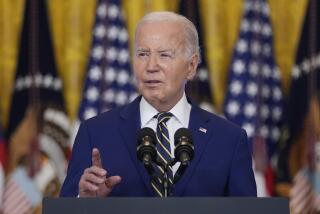Ban on travelers with HIV to U.S. partly lifted
WASHINGTON — President Bush signed a sweeping measure Wednesday that provides $48 billion to combat AIDS and other diseases globally and that also ends a long-standing U.S. ban on foreign visitors and immigrants who are HIV-positive.
The travel ban, approved in 1993, was seen by opponents as an anachronism from a period of hysteria surrounding gays. Its repeal, however, does not remove all U.S. travel impediments.
Activists will now turn their focus to the Department of Health and Human Services, which in 1987 placed HIV on its list of diseases barring entry into the U.S. That prohibition is separate from the congressionally imposed travel ban. But with the overarching ban by legislators repealed, federal health officials are no longer bound by law to keep HIV on the list.
“It’s hard today to put yourself back there and imagine the kind of ignorance and misinformation that was prevalent in the early 1990s,” said Rachel B. Tiven, executive director of Immigration Equality, a New York-based group that advocated repealing the ban. “People believed the most fantastical, unrealistic things about gays. Congress has finally cleared the way to reverse that series of bad decisions 20 years ago.”
It’s unclear whether Health and Human Services plans to address the ban in the near future. An agency spokeswoman did not return a call for comment Wednesday. The Centers for Disease Control and Prevention, which is under Health and Human Services’ jurisdiction and would make recommendations about the ban, also couldn’t be reached.
But advocates of repeal said they were hopeful. In 1991, Health and Human Services proposed removing HIV from its list of diseases barring entry into the U.S. But the move drew outrage from religious conservatives, who delivered thousands of letters during a public comment period, derailing the effort, said Victoria Neilson, legal director for Immigration Equality.
A similar public comment period would be likely if the agency again proposed to remove HIV from the list.
“That’s where the battle may be,” Neilson said. Attitudes have changed, however, and the debate may be different today, she added. During Senate debate on the AIDS bill this month, conservatives steered clear of a fight over the provision to repeal the travel ban.
“People understand it’s a virus, not a black plague or something. There’s no reason for a disease that isn’t airborne to be on the list,” Neilson said.
Only 11 other countries, including Saudi Arabia, Sudan, Libya, Iraq and Colombia, maintain such a travel ban. Other diseases triggering the U.S. travel ban include leprosy, gonorrhea and tuberculosis.
Waivers are available, but activists consider them unfair and burdensome. A short-term waiver allows foreigners to visit temporarily if they can show that they don’t have HIV symptoms, don’t pose a threat to public health and can pay for their medical care, if necessary.
For some of those directly affected, the ban has led to years of frustration. Howard Wallen, 39, of New York met his future wife, Abeba, while traveling through Ethiopia’s northern Tigray region in 2002. They married five months later. Soon thereafter they learned she was HIV-positive, setting off a struggle to get her into the U.S. that lasted until her death in Egypt last September.
U.S. officials would not allow her to enter the country unless she had health insurance, Wallen said. He found insurance companies that would cover his wife, but only if she was physically present in the U.S.
It was a “classic Catch 22” resulting from the travel ban and illustrates the challenges posed by the waivers, said Tiven, of Immigration Equality.
Today, Wallen’s 4-year-old daughter, Hana La Paz Wallen, can fluently speak both English and Amharic, her mother’s native language.
“America’s a blessed country and a beautiful place . . . but what we had to go through with separation was unfair,” Wallen said, fighting back tears. “I don’t want other families to suffer the way we have. The bill is about taking a step in the direction of ensuring that dignity for other families.”
More to Read
Sign up for The Wild
We’ll help you find the best places to hike, bike and run, as well as the perfect silent spots for meditation and yoga.
You may occasionally receive promotional content from the Los Angeles Times.






